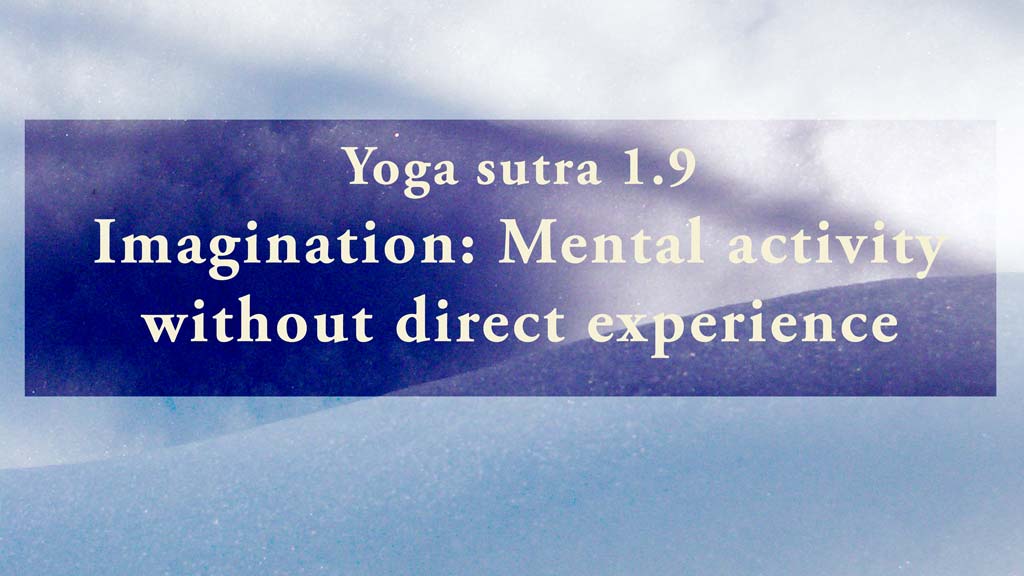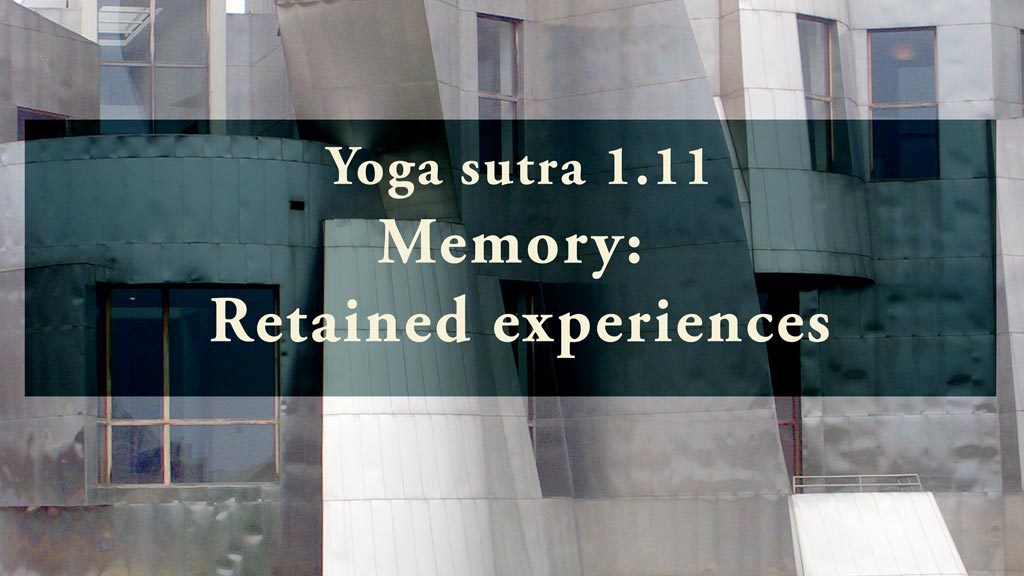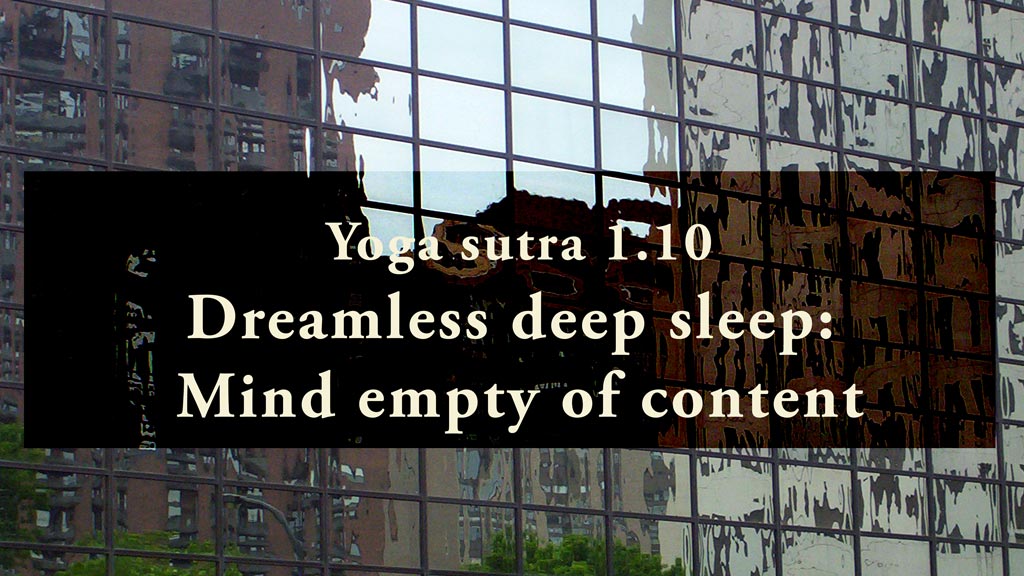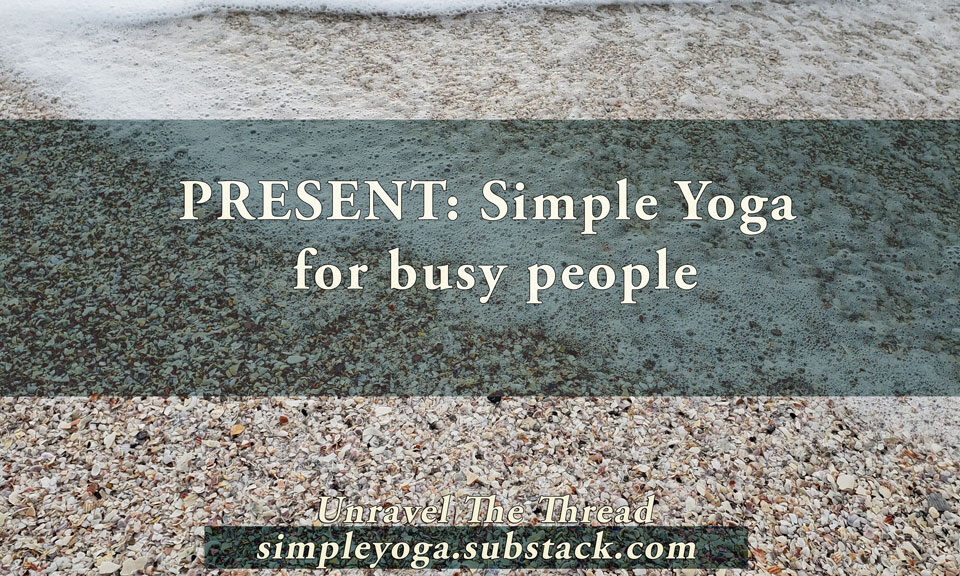
1.9 Imagination
April 28, 2019
1.11 Memory
May 6, 2019
1.9 Imagination
April 28, 2019
1.11 Memory
May 6, 20191.10 Sleep


1.10 Dreamless deep sleep (nidra) is when the mind is empty of content.
The Sanskrit word nidra is translated both as sleep and as dreamless deep sleep. Sleeping is when you give all your systems a chance to relax, restore and rejuvenate. A lot of what happens during sleep is still a mystery, and thus a fertile ground for systematic contemplation. From the yogic perspective, the process of sleep is one of processing, digesting and releasing thoughts, ideas, plans and beliefs. In fact, if you can’t let go of some idea or worry, you will probably have a hard time falling asleep. As you fall asleep, your awareness turns inward, and reception of external sensory stimuli is turned off. During dreaming you witness what has left an impression in you during your daily activities and interactions. In this timeless space, impressions collected at different times combine in several ways. This combination of disparate memories is an attempt to digest, consolidate and perhaps resolve some of the unresolved challenges you have faced. Clearly, the dream state is one form of internal activity (vrtti).
However, in dreamless deep sleep, even the subconscious activities seem to be turned off. In addition, during dreamless deep sleep, identification with temporary phenomena dissolves and sensory perception is turned off. Moreover, brain activity decreases to a minimum and even the strong associations with name, age, and other personal labels fade. The idea of being separate also dissolves. In dreamless deep sleep, the boundaries imposed by body, thoughts and emotions disappear and you merge into spaciousness and oneness. This is quite similar to stages of meditation, with the significant difference that during dreamless deep sleep we are not fully conscious.
Sleep is generally a time for recovery, repair and renewal at physical, mental and emotional levels. Is the silence and stillness of deep sleep a way to connect to the pure consciousness underlying everything that exists? Is that how insight and inspiration blossom, offering simple and elegant solutions for the problems or challenges you might be facing? If this is so, you can ponder how your current ways of being facilitate deep sleep by noticing any patterns that foster or hinder your ability to rest and relax deeply.
Do you know how much sleep you really need? To what extent are your daily activities conducive to deep sleep? Are your sleep patterns conducive to regulating your internal clock? A simple experiment is making peace with your day. At the end of the day, when you are already in bed and ready to go to sleep, relax fully and take time to review your day with the perspective of this moment. Choose to make peace with your day, including what went well, what did not go so well, what turned out badly, and everything else. Then, instead of starting to plan the next day, relax in the knowledge that you tried your best, so that you can make peace with yourself. This practice can combine nicely with the practices suggested for verses 1.3, remaining with the peaceful calmness from sleep when you first wake up, and 1.4, becoming aware of the first thoughts that arise in the morning, to create a ritual that may help you sleep better and wake up rested and calm.
As usual, you can be curious to experience directly how you feel when you chant this sutra.
You can choose to chant the traditional version:
अभावप्रत्ययालम्बना तमोवृत्तिर्निद्र ॥१०॥ abhāvapratyayālambanā vṛttirnidra
or, you can chant each word individually
- abhāva
- pratyaya
- ālambanā
- vṛttiḥ
- nidrā
Unravel the thread is now available as a book!
If you find Simple-Yoga.org and Unravel the thread useful, consider supporting my labor with a donation, you may also donate using PayPal or Venmo. Thank you!
